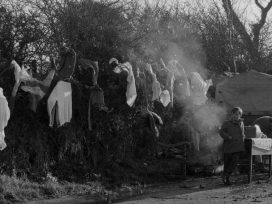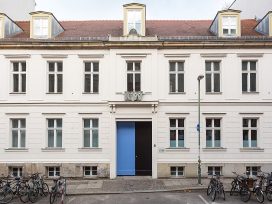The good news is that the Romanian public still trusts the Romanian mass media. Public opinion polls published by the European Commission in July 2008 show that the number of Romanians whose principle source of information is audiovisual is up 10 per cent on last year. Television attained a remarkable level of trust 72 per cent with radio receiving 70 per cent. Only the army receives a higher rating with 74 per cent. The written press holds an honourable fourth place with “only” 60 per cent trusting it.
The bad news is that the Romanian public still trusts the Romanian mass media completely, no matter what it does. Given this level of trust, whatever a journalist says is taken as gospel by the public. This is a huge responsibility – anything they write becomes enshrined as truth for 70 per cent of the population. It is also bad news for a public whose critical spirit is yet to be born.
But things are as they are. So we come back to the question of what these journalists owe to a public who trusts them so unquestioningly. How do we identify journalists who take their duty to the public seriously?
Self-regulation, complete with its codes of practice and mechanisms of implementation is the answer. This was the subject of a conference at the end of October 2008. The Convention of Media Organizations (Conventia Organizatiilor de Media – COM) brought together around 40 organizations representing media professionals. The Romanian Press Club took part in the round table discussions along with the Association of Romanian Journalists and the Federal Syndicate MediaSind. To work efficiently, self-regulation needs two things: codification and the means of implementation. In Romania there is no lack of ethical codes – we counted at least 15. Their large number was not a problem. Their content is more or less the same: broadly speaking, they all recognize the same best practice and journalistic values. Their main differences are in the level of detail and the means of implementation. The assumption of responsibility and the “internalization” of the document by the group that created it is more important than the particular document. However, it is precisely because these codes are fundamentally the same that we can unify them and, in the process, attempt to unify the profession, create a critical mass around a single of self-regulatory document and consolidate the journalists’ control over their own profession.
The COM participants set about unifying the different ethical codes under three main headings:
– best practice for journalists;
– the relationship between journalist and reader;
– the relationship between business and editorial sides of the industry.
In the hurly-burly of everyday life, the business of good and bad frequently become a relative matter. Journalists are better served by a code of “best practise”: something that says to the world “these are our rules, this is how we go about our business” rather than absolutist codes defining right and wrong.
The administration of an ethical or practical code requires a “moral authority”. This is relatively easy to implement within an organization whose members share the same outlook and values, but at the wider professional level, implementation has proved impossible over the last 20 years. This is why, rather than waiting another 20 years – it seems Silviu Brucan was an optimist after all – the media are acknowledging the need to set up some form of professional body to help establish this “moral authority”. One suggestion is a Press Council similar to those operating in Germany and the UK. Such a body, somewhere between judge and jury, would be empowered to adjudicate on public complaints about the media and judge journalists and organizations in the light of their own code of ethics. In practice, the council would not decide whether a journalist or organization had acted for “good” or “ill”, but rather whether they had acted in good faith and whether the public interest had been served. The terms of reference/standards by which journalists would be judged would be similar to those operating in the European Court of Human Rights.
Self-regulation should also include editorial teams involved in television and radio to ensure professional competence and transparency in line with EU legislation. The success of self-regulation in Romania will be measured by the extent to which all parties in the media feel their interests are reflected and respected.
The conference also looked in some depth at the relationship between regulation and self-regulation, particularly in relation to audiovisual broadcasting. The broadcasting law has the status of secondary legislation and the broadcast sector can be sanctioned for breaching it. What is the point in self-regulation when legal statutes already exist? Current legislation is limited to those areas defined in the statute: the protection of human dignity, children and diversity, and the censure of racism, xenophobia and incitement to hatred. Publications are covered by separate legislation. However, many aspects of the work of journalists remain outside the law and it is here that self-regulation can show its worth. Moreover, CAN (National Audiovisual Council) and the regulations it implements apply only to television and radio, but in the age of the Internet, audio and visual content appears on many websites including the official websites of publications that escape these regulations. The expansion of multi-media content is another reason for self-regulation.
The relationship between journalists and the public is important and any attempt at self-regulation must keep that in mind. The public must be satisfied that the rules of best practices have been implemented. It is equally clear that self-regulation demands the widest possible participation. It will work only for those who attach an ethical value to their profession and are willing to correct honest mistakes when they happen. This sort of mechanism is not about criticizing poor quality journalism or dealing with those who have an agenda who are adept at implementing their plans. The impact of self-regulation depends on building up a critical mass of professionals around a concept that can visibly influence the professional media and demonstrate to the public the difference between quality and tabloid journalism. The process is in its early stages; nothing is final and we have only the bare outlines of what will be an extremely complicated and lengthy process. Nothing I have written here, I hope, can be used to argue against an idea that seeks to be inclusive and to work for the greater good not only of journalists but for the industry as a whole.
A final note: in New Orleans, there is an altar to Saint Jude – the patron saint of lost causes: the hope of the hopeless. I visited it in September last year and mentioned the self-regulation of the mass-media in Romania…






